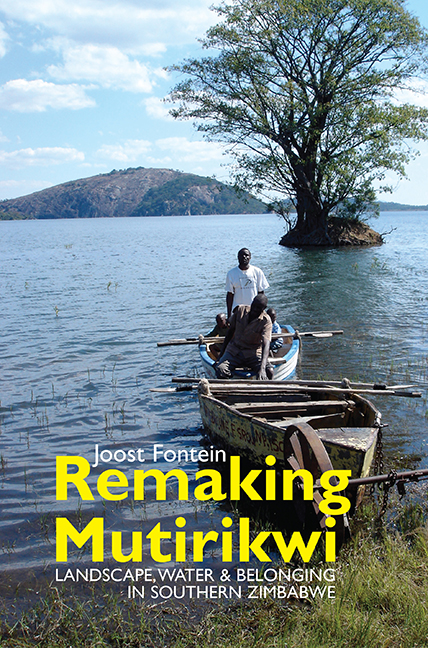Book contents
- Frontmatter
- Dedication
- Contents
- Illustrations
- Acknowledgements
- Note on Fieldwork, Notes & Sources
- Glossary
- Acronyms & Abbreviations
- Chronology
- Remaking Mutirikwi: An Introduction
- Part One Remaking Mutirikwi in the 2000s
- Part Two Damming Mutirikwi 1940s–1990s
- Epilogue: Remaking Mutirikwi in the late 2000s & early 2010s
- Bibliography
- Index
- Eastern African Studies
3 - Rain, Power and Sovereignty
Published online by Cambridge University Press: 11 June 2021
- Frontmatter
- Dedication
- Contents
- Illustrations
- Acknowledgements
- Note on Fieldwork, Notes & Sources
- Glossary
- Acronyms & Abbreviations
- Chronology
- Remaking Mutirikwi: An Introduction
- Part One Remaking Mutirikwi in the 2000s
- Part Two Damming Mutirikwi 1940s–1990s
- Epilogue: Remaking Mutirikwi in the late 2000s & early 2010s
- Bibliography
- Index
- Eastern African Studies
Summary
CENSORING THE WEATHER FORECAST
In November 2010 a senior government meteorologist revealed that for much of the previous decade Zimbabwe's weather forecast had been censored on a daily basis by the President's Office. The admission came in response to journalists’ questions about ‘why the meteorological service department (MET) had over the years denied possible droughts’ that were later experienced despite predictions that ‘the country was expecting above average rainfall every year’. Also blaming ‘obsolete weather equipment’ and the loss of experienced personnel for the ‘inaccurate weather forecasting’, Washington Zhakata ‘admitted that there is heavy political interference and censorship of the weather forecasts in Zimbabwe before it is issued out to the public’. ‘This information’, he said, ‘was seen as sensitive’.
What this sensitivity amounts to is the subject of this chapter. A clue can be found in a much earlier news item in the international press, which had reported (amid official denials) that ‘the president's office took control of the forecasting service’ in 2003 ‘after learning that the drought-affected country is facing two more years of low rainfall’. Then a series of droughts had coincided with the first three years of fast-track land reform, deepening economic and political crises, and widening discontent about food shortages.
‘The government does not want any information on the weather to be leaked’ an official from the Meteorological Office said. ‘All our forecasts are to be sent to the president's office, and only then can they be released’ … Informed sources said Mr Mugabe feared that the revelation that no early end to the drought was in sight would heighten discontent at a time when nearly half the country's 13 million people are going hungry. Food riots have already erupted in the capital, Harare, and the south-western city of Bulawayo this month. The development came as the World Food Programme said the harvest of the staple maize would be poor for the next two years … The impact of the regional drought has been compounded by Mr Mugabe's crude land redistribution program, which has crippled the country's agricultural sector and left swathes of fertile land unplanted.
Although the political consequences of food shortages and rising prices are undoubtedly of great significance in Zimbabwe's recent history, they do not alone adequately explain this long-term commitment to daily interference in the weather forecast.
- Type
- Chapter
- Information
- Remaking MutirikwiLandscape, Water & Belonging in Southern Zimbabwe, pp. 78 - 111Publisher: Boydell & BrewerPrint publication year: 2015

